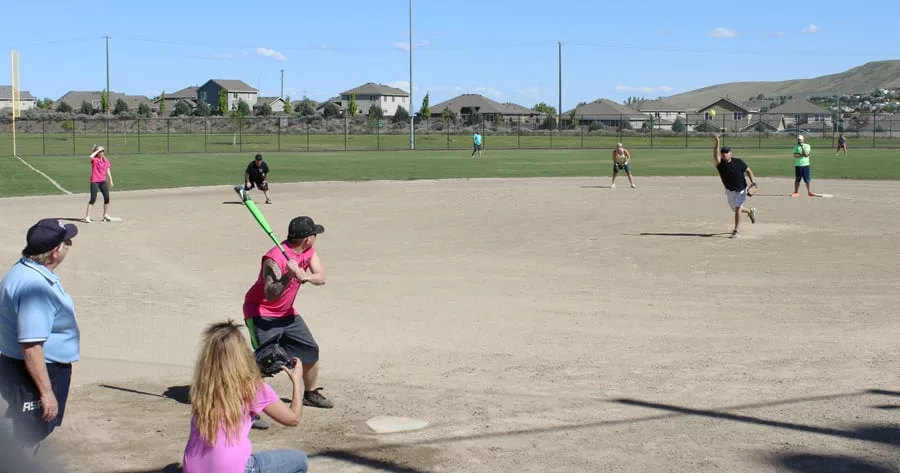
Home » Diamonds in the Desert: Tri-Cities’ sports fields catch a lot of cash for local economy
Diamonds in the Desert: Tri-Cities’ sports fields catch a lot of cash for local economy

May 13, 2016
By Jeff Morrow for TCAJOB
Steve Jensen lives in western Washington town of Arlington. But he just absolutely loves the Tri-Cities.
Jensen is a National Softball Association state tournament director for Washington who has run two major girls fast-pitch tournaments in the Tri-Cities every year since 2007: the Icebreaker in April and the state tournament in June.
“The facilities there are so good,” said Jensen. “The other good thing is that so many complexes and fields are within a few minutes of each other. We use 32 fields just for the Icebreaker.”
And the Tri-Cities’ mild spring weather is another big bonus for Jensen.
“I have 130 teams here and the last thing they want is to get rained out,” he said.
The two tournaments have been so successful that Jensen has added a new one, the NSA Western World Series, which starts July 20 in the Tri-Cities.
“The hotels are awesome to work with, and the parks departments are great,” said Jensen.
Drew Reiners, the manager for the Western Baseball Division of Triple Crown Sports out of Fort Collins, Colo., agrees with Jensen’s assessment. His organization has a Father’s Day weekend baseball tournament for players ages 9 to 18 in the Tri-Cities. The tournament has been taking place every year since 2007.
“The last few years, we’ve had anywhere from 95 to 120 teams playing that weekend in the Tri-Cities,” said Reiners.
Reiners said that only about five of those teams are actually from the Tri-Cities, which means the majority are coming from elsewhere – many from western Washington. That means a lot of the area’s hotel and restaurants score during the tournaments, as well.
Reiners’ organization uses the fields at the Southridge Athletic Complex, Lawrence Scott Park and the Civic Fields complex in Kennewick; TRAC in Pasco; and the Kingsgate fields in Richland.
“The facilities in the Tri-Cities, they’re a huge piece of our success there,” said Reiners. “That, and the weather. But their facilities are phenomenal. It’s just a nice atmosphere.”
That’s music to the ears of Hector Cruz, the director of sports development for Visit Tri-Cities, the region’s visitors and convention bureau.
Altogether, Cruz counts 69 baseball fields of various sizes in the Tri-Cities, including West Richland. There are also 50 softball fields, including those at private schools.
Visit Tri-Cities doesn’t break down the total revenues each year by sport. It also includes conventions in those revenues, and there are some local sports tournaments that don’t report figures to the Visit Tri-Cities organization.
But in November 2015, Visit Tri-Cities reported 227 events (conventions and sports events) had that attracted 132,195 visitors, resulting in an economic impact of $40.5 million.
The group also reported estimated, based on the number of events booked at the time, the Tri-Cities would attract more than 150,000 visitors in 2016, to 196 events, creating an economic impact of more than $50.7 million.
Sports tournaments play a major role in those numbers. And Cruz said each year the number of baseball and softball tournaments grows.
“Baseball and softball have grown significantly in our community,” said Cruz. “People around the country know us as a sports destination because of softball and baseball. From a Visit Tri-cities point of view, it’s great because it creates a repeat visitation. People come here for a tournament for their first visit, then come back for a vacation.”
That new July tournament that Jensen is going to run? Cruz said the bureau expects 4,000 visitors with an economic impact of $1.1 million.
Other incoming softball tournaments this year, either run by USA Preps or the Amateur Softball Association, will garner anywhere from $350,000 to $445,000 in economic impact.
The success story is created by a great working relationship between Visit Tri-Cities, the cities’ parks and recreation departments and the region’s hotel and motel operators. The area needs to be enough hotel rooms to bring new tournaments, but Cruz and his staff know it is a fine line.
“We have to be careful because we don’t want to over-saturate things,” said Cruz. “If someone comes in and can’t get a hotel room, that’s bad. You want to make sure no one has that bad experience.”
Cruz knows the numbers. He and other Visit Tri-Cities staffers attend four conventions a year to meet with sports organizations and sell the Tri-Cities to them. They’ll know whether a certain tournament will work on a specific weekend, based on hotel room availability.
Sometimes a representative from one the three cities will go too, to illustrate the close and positive working relationship between the cities and Visit Tri-Cities.
“That’s not always the case with other communities,” said Cruz.
The complexes, where at least four fields are at one location, can be a major draw to bring tournaments.
“Playing in tournaments, it’s nice when you don’t have to leave to go to another field,” Cruz said.
He points to the Kingsgate baseball complex near Horn Rapids in Richland. It’s part of the Hanford Legacy Park project and the Richland Babe Ruth league runs the complex.
“You don’t see many of those complexes with four fields with 90-foot base paths,” said Cruz. “For planners of sports tournaments, that’s an attraction to them.”
But it’s not just tourists spending money in the Tri-Cities on sports.
Locals are also spending plenty of time on those diamonds:
- The Mid-Columbia Senior Softball Association, a league formed for men 50 years and older and women 45 and up, expanded from six teams in 2015 to eight teams in 2016.
- The Tri-City Adult Baseball League, for players 18 years and older, had five teams in the 2015 league. It played the majority of its games at Kingsgate.
- The high school fields are used pretty heavily during the summer months by American Legion teams and Babe Ruth baseball squads. The three cities alone have 15 American Legion teams spread out over three levels of play.
- Karen Coulson, Kennewick’s sports and events supervisor, said the city’s co-ed softball league has averaged 42 teams over the last few years, and the men’s league increased to 22 teams this spring.
Sports is big business. And this story doesn’t even address the large number of soccer teams and tournaments.
And Rick Terway, Pasco’s administrative and community service department director, said his city has to start thinking about other sports too.
“We expect to have lacrosse and rugby eventually,” said Terway.
While youth lacrosse is becoming popular in Kennewick and Richland, it hasn’t hit Pasco yet. As for rugby, Terway said although it really hasn't reached the Tri-Cities, it is popular in larger cities like Portland and Seattle.
“It’ll get here down the road,” Terway said.
For Chrissy Hughes, president of the Tri-Cities Girls Fastpitch Softball Association, things have never been better in the league.
“We have 750 to 800 girls out this year,” said Hughes. “Last year we were right around 700.”
That’s a great jump, but Hughes isn’t sure why it’s happened.
“That’s a good question,” she said. “I don’t know if it’s because more kids are getting interested in extra-curricular activities, or it’s more people moving into the area.”
Terway believes it is a combination of both.
“Generally speaking, our programs are successful. The demand is there,” he said.
But not everything is perfect.
Although there are a lot of diamonds in the Tri-Cities, there are not enough softball fields, Hughes said.
“There may be for games, but there aren’t enough fields for practices,” she said. “Some of our teams go into the late hours of the day to get practices in. There is a total of five (softball) fields in Richland with lights.”
Terway agreed with Hughes and said that in general, sports field space is inadequate — not just for softball and baseball. Pasco is all maxed out on space or close to it, Terway said.
“Our (city) council’s priority is to find more field space,” he said. “We’re looking. We have our feelers out. But quite frankly, we need 50 to 60 acres to use it right.”
Stan Johnson, Richland’s Parks and Recreation coordinator, said there’s a chance that Hanford Legacy Park, where the Kingsgate complex is, could eventually expand. But that timeline is down the road.
“The master plan is out 20 years,” Johnson said. “There are plans for slow-pitch softball fields and soccer fields.”
But he cautions that it may have to be a financial partnership with interested groups.
Johnson said Richland recently add a fifth field to the Columbia Playfield softball complex next to Richland High School. In that case, the city took an old Little League baseball field and turned it into a softball field.
Coulson was involved in the Southridge fields, a four-field complex that opened in 2012.
“When we first started the design process of the fields, we met with local baseball and softball organizations,” Coulson said. “We realized there was a bigger need for bigger fields.”
The Southridge fields can be used for baseball, softball, soccer and lacrosse. Two of them have 90-foot base paths, and the fences are 400 feet away from home plate – making them coveted by older player baseball leagues.
As it is, Southridge has booked some type of baseball or softball tournament at the complex almost every weekend through August.
So local governments are trying to respond to citizens’ demands for more playing facilities.
For what the Tri-Cities has, it’s been put to good use these past few years. No fields go unused.
“Do we have too many (sports) tournaments? We still have opportunities to bring in more,” said Cruz. “But it’s a balancing act.”
Johnson agreed.
“We are running out of dates,” he said. “But we did add a college softball tournament this year and we’re actually pursuing more events.”
Business, in other words, is great.
Local News Hospitality & Meetings
KEYWORDS may 2016 tourism recreation





